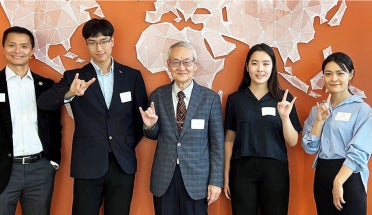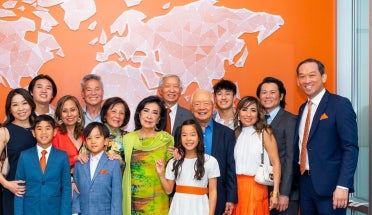
Celebrated Alum’s Acumen Transforms Education, Global Impact, Lives
- Mar 26, 2024
- Global Alumni Relations
- by Ellen Stader
[Editor's Note: This story is part of a Texas Global series celebrating Women's History Month, highlighting contributions to global engagement made by extraordinary women, past, present and future.]
Connie Duckworth’s focus on women’s economic empowerment comes from a source both likely and unlikely: financial giant Goldman Sachs, where she broke barriers in the Los Angeles, Chicago and New York offices for 20 years as a partner and managing director.

“Having grown up in business when there were relatively few women, I’ve always mentored women,” said Duckworth, a Longhorn alumna (B.A. ’76). “I’ve helped promote women and helped the firm organize family-friendly policies.”
The skills she learned in the private sector later proved equally useful when Duckworth founded ARZU, Inc., an innovative model of social entrepreneurship in Afghanistan that helps women weavers and their families break the cycle of poverty.
Now, as chair of the International Board of Advisors (IBA) at The University of Texas at Austin, Duckworth uses those skills to help guide the board in leveraging the University’s significant power; mobilizing alumni engagement internationally; and cultivating business partnerships to support leading-edge research.
Circuitous Route to Business
After graduating as a Plan II major, Duckworth had been accepted to enter the UT School of Law. But between graduation and the fall term, while working at the Texas Legislature, she made a surprising discovery.
“I got partway through my job at the Capitol and decided I didn't want to be a lawyer,” said Duckworth. “I thought, ‘If this is what lawyers do, then I’m going to do something different.’ ”
Changing directions, she applied to business schools — and was not only accepted but also offered a scholarship by the famed Wharton Business School at the University of Pennsylvania.
"I packed my car up sight unseen and drove to Philadelphia,” Duckworth recalled with a laugh. She pursued a dual degree in finance and accounting, graduating in 1979 with an MBA from one of the United States’ top business schools.
“I've always been grateful that Wharton accepted me and gave me that toolkit because it really changed the trajectory of my career,” she said. “That's how I went into business for the next 20-plus years.”
Decades with a Titan
Duckworth first joined investment banking firm Goldman Sachs in 1981 in Los Angeles. In 1990, she was named the first woman sales and trading partner in the firm’s history. Then, after a transfer to direct the Chicago office, her family put down roots in the community of Lake Forest. So when yet another offer came from the firm, it carried more complications.
“I had four children between the ages of 1 and 7, and I was asked to move to New York to run a business there,” Duckworth recalled. “It was easier to commute Monday through Friday to New York than to decamp my army and relocate.”
By that point, Duckworth and her family were deeply ensconced, and she “couldn't even comprehend” uprooting her family and recreating their life in another city. So instead, she boarded a 6 a.m. plane for New York every Monday and flew home every Friday evening. She made this commute for almost four years, until the 2001 attacks on the Twin Towers, then retired at the end of that fiscal year with an illustrious 20-year run to her name.
“I loved my career,” said Duckworth. “I loved the firm — I grew up there, basically — but I'd just decided I was missing too much at home. So I went back to Chicago.”
From Wharton to Weaving
Once Duckworth retired, she joined numerous corporate and nonprofit boards, including the Committee of 200, a U.S. organization of women entrepreneurs and corporate business executives.
A friend from the committee nominated Duckworth as business representative for the U.S. Afghan Women’s Council in Washington, D.C. Formed in early 2002 after the fall of the Taliban, the council aimed to support Afghan women’s and girls’ education, health care and economic empowerment.
Despite knowing little about Afghanistan, Duckworth accepted the post. By January 2003, she was boarding a military plane for a flight to Kabul, still considered an active war zone.
At the former U.S. Embassy, where the façade bore bullet holes from civil war in the 1970s, Duckworth’s group bunked in cargo containers transformed into sleeping quarters. Traffic comprised a few donkey carts and old buses as the visitors traveled around the city. And the weather was bitterly cold.
“They had warned us there would be no heat in any of the buildings,” recalled Duckworth. “We met with everybody from President Karzai to widows living in rubble, some of them trying to shelter for the winter in a bombed-out, Soviet-style building with little kids, dozens of them. Some of the kids had flip-flops on.”
The stark scenes drove home her understanding of the country’s desperate need for infrastructure and stability, work and income. And she knew she needed to make change happen for women — a daunting proposition, given traditional strictures on women’s activities in Afghanistan.
“I remember thinking: ‘If I'm the business representative, then I'm responsible to do something to employ women in Afghanistan,’ ” Duckworth said.
Women’s Economic Empowerment
Duckworth’s team set out to identify a business model that would work in a gender-segregated society with no internet or electrical grid. They landed on the idea of woven rugs — a traditional handcraft already being executed at a high skill level by local women.

The result of the brainstorming was ARZU, Inc., a nonprofit offering lucrative work, education access and social support to women weavers in Afghanistan. Structured unconventionally, the organization hired locals instead of expatriates for staff positions. And Duckworth established operations in a rural area, where villages were difficult to access and English nonexistent.
The remote location complicated logistics but also, paradoxically, made work easier in some respects. The area’s minority Shiite tribe, historically scorned and disadvantaged in the country, were most receptive to participating. This local buy-in would prove invaluable to the program’s success.
“What we built was something viewed as very local,” said Duckworth. “We had a whole ecosystem that we developed in a holistic way.”
Once a weaver expressed interest, Duckworth and her team would present an innovative social contract bearing three tenets, to which the entire family must agree, and which the male head of the household was required to affirm with a thumbprint (in lieu of a signature):
1) All women in a participating household must be released daily to attend literacy classes in a nearby village; 2) Children must be enrolled full-time in government-funded schools; and 3) Families must allow Arzu staff to transport pregnant women to regular medical checkups.

“At that time, Afghanistan had the highest maternal death rate in the world,” said Duckworth. “But we did not lose a single mother or baby in childbirth once we started the maternal health program, and that was over an 8- or 9-year period.”
Arzu paid weavers the standard local rate, also covering production costs — then added a 50 percent quality incentive bonus for high-quality rugs woven to international standards. Participating weavers came to earn about two-thirds more than Afghanistan’s average national per capita income, which included men working higher-paying jobs in cities.
“I believe that when a woman can earn a living, it changes the power relationship in the household,” Duckworth said.
Private Sector Informing Public Service
Duckworth cites valuable lessons from the private sector, which combine into a “business toolkit” that applies well to social service and aid work. To young women who express a passion for social entrepreneurship and NGO work, she recommends a career in business first.
“They say, ‘I'm really motivated to go into nonprofit work,’ and I tell them, ‘The best career for you is a business career,’ ” said Duckworth. “Learn what there is to learn, then you can deploy it so much more effectively in the nonprofit world.”
After 17 years of success — a generation’s worth of improved lives — Arzu merged in 2019 with a United Kingdom-based charity that pursues a similar mission of preserving traditional Afghan arts and crafts. Duckworth turned her attention to the future with a definitive assessment about her past:
“I could not have done Arzu had I not had a business career.”
IBA: Expanding Outreach Across the World
Connie Duckworth’s resourceful, global perspective has proven useful in today's venture: chairing the UT International Board of Advisors (IBA), a select group of alumni and supporters who share the vision of expanding the University’s international reach.
“Our goal is to support UT’s mission, reputation and global impact,” Duckworth elaborated. “To mobilize and amplify alumni engagement. To partner with businesses for greater opportunity and impact on the education front. And to pursue leading-edge research through scholarship.”
Taking its lead from President Hartzell's 10-year strategic plan, the IBA focuses its work across three vital research areas: health and well-being; technology and society; and energy and the environment. Duckworth explained that collective brainstorming proceeds from the question, How can we engage international alumni to best mobilize around the strategic plan?
With acumen and aplomb befitting her financial, logistical and humanitarian accomplishments, Connie Duckworth summed up the task facing her IBA cohort in the coming years:
“The key is really about leveraging the incredible power of UT. And with President Hartzell’s goal to become the world's highest-impact public research university, we're setting our sights high.”



